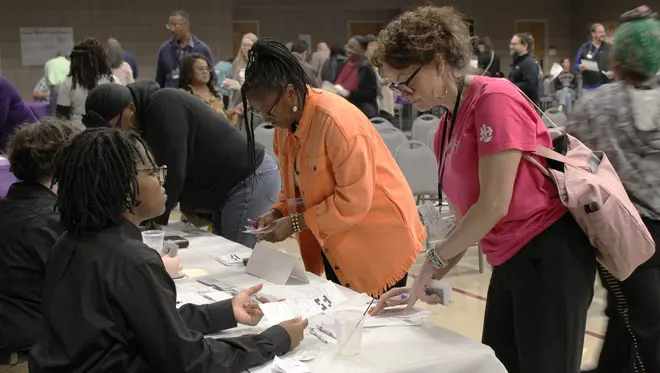Reentry Simulation Brings Awareness to Barriers Faced After Incarceration

Published
Tulsa Community College and its partners hosted a Reentry Simulation on Oct. 24, giving participants an interactive experience of the challenges justice-impacted individuals encounter when reentering society after incarceration.
Tulsa Community College and community partners hosted a hands-on Reentry Simulation offering participants an immersive look at the challenges justice-impacted individuals face when returning to society after incarceration.
About 75 participants and volunteers gathered at Boston Avenue United Methodist Church to take part in the experience, which placed attendees in the role of someone newly released from jail or prison. Participants were tasked with securing employment, housing, transportation, and essential services, while meeting supervision requirements and navigating paperwork and deadlines. The experience was designed to build understanding among employers, social service professionals, and community members who work with or encounter justice-involved individuals.
“The Reentry Simulation is a learning experience that helps participants understand how difficult it can be to rebuild your life after incarceration,” says Ramona Curtis, Ph.D., TCC Director of Workforce Programming. “It’s easy to assume someone can simply get a job or housing, but the reality is filled with obstacles that can derail progress. Walking through that process gives you an opportunity to reflect on changes that can eliminate barriers.”
Curtis notes the event brings together a wide range of participants, from law enforcement to educators and employers, to experience firsthand what many Oklahomans face during reentry.
TCC alumnus Darrell Elliott was incarcerated at 18 and says pursuing education through TCC while in custody gave him confidence and helped him prepare for life beyond incarceration.
He says many justice-impacted individuals have ambition to succeed if given the chance.
“Not only do some of those people have the skills, they have a lot of drive,” Elliott says. “They have a desire to succeed. I go above and beyond at my job, and that’s the reason why I’ve gotten into the position that I’m in now—because of my work ethic.”
Since his release in summer 2024, Elliott has built a new life in Tulsa. He now works full time in Human Resources and accounting for Patriot Auto Group and remains involved with 1440 Promise, a nonprofit that helps justice-impacted individuals learn entrepreneurship.
Elliott hopes those who participated in the simulation gain a greater understanding of what people face after incarceration.
“It is important for people to be open-minded and experience it in the sense of being able to speak to people, being able to provide clearer paths, and getting to know them as an individual.”
The Reentry Simulation was hosted by TCC Workforce Development, Boston Avenue United Methodist Church, Domestic Violence Intervention Services, and Penn State’s Restorative Justice Initiative, with funding provided by the American Institutes for Research.
